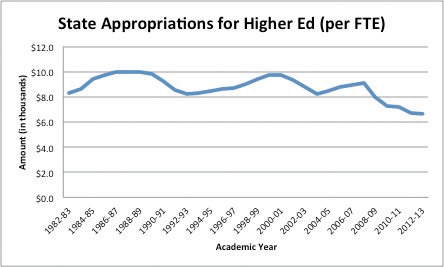Civically Engaging with Alex Zank
Benefits for students, society far outweigh cost of attending, funding college

“F” FOR FUNDING: State appropriations per full-time equivalent students for the 2012-2013 academic year are the lowest it’s been over the last three decades at $6,600 per student for 2012-2013, down from as high as $10,000 per student. The data include enrollment for the fall semester of two- and four-year public colleges. Graphic by Alex Zank, The Spectator
There is not a better way I can think of ending this column than with my own reflections of my academic experiences at UW-Eau Claire while tying it into politics.
The one thing I’ve learned from being a college student is that I really don’t know anything, which seems like the opposite of what an undergraduate degree is intended to do.
In reality, I have learned a lot. My liberal education has just opened so many intellectual doors for me that I now understand how much there is to still learn about the world.
I feel stupid knowing what I was like after graduating high school. I thought I knew a lot about my fields of study; I was supposedly well-versed in politics and a supposed fantastic writer.
I spent another five years learning more about these topics (and making an excellent choice to study economics as well) in college. Now, I realize that I knew nothing in 2009 compared to 2014. And I also know there is plenty more to learn.
In addition to an education, I think college gives us this revelation about ourselves. College grants students a degree as well as an experience.
The price we pay for college, though more expensive than ever, is small relative to the benefits.
A new Gallup-Purdue University study shows the type of experience we have at college improves our future life satisfaction. In fact, our college experience itself matters even more than the college we choose to attend.
Set aside the higher pay and the better odds of getting a good job for a second. Depending on what students do while attending, the college experience itself leaves graduates more satisfied in various aspects of their lives.
The economy reaps the benefits of a strong and educated workforce as well. This is no secret.
In fact, college towns like Eau Claire rely on the spending of university students and faculty to strengthen the local economy. Imagine if UW-Eau Claire was located elsewhere and students were not here to spend money on groceries, restaurants and recreation.
Higher education is beneficial all around, although public investment surely does not reflect this.
Data from the College Board Advocacy & Policy Center website shows state appropriations to public colleges for academic year 2012-13 is the lowest it has been since at least the 1982-83 academic year.
I’m sure my personal experience is just one of many examples of why college is so crucial to both the next generation and the furtherment of society.
To ensure we progress at the highest degree, we must invest in the future like we mean it. This includes a renewed public investment in higher education.






